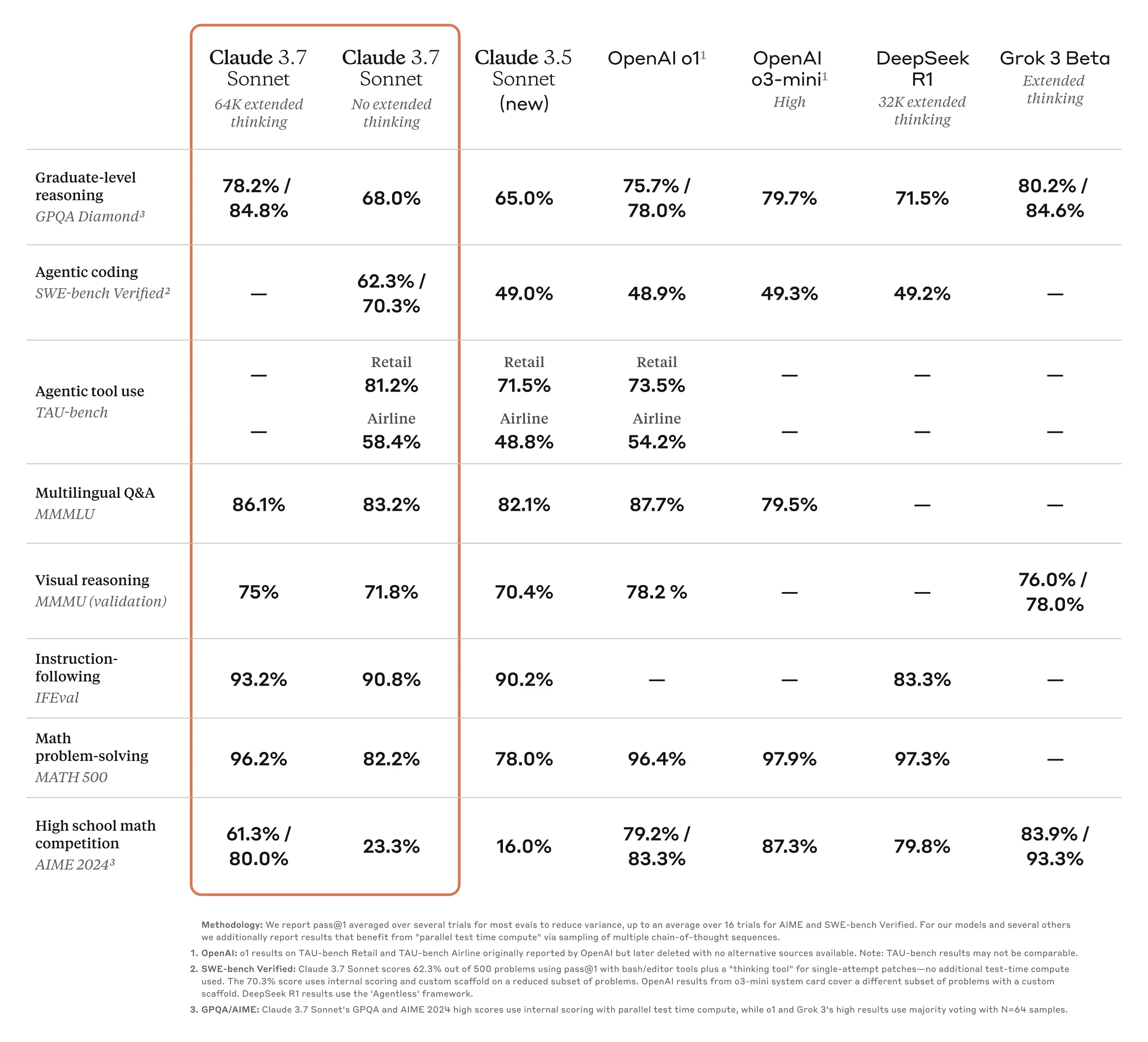Claude Sonnet 4


Hybrid reasoning model with superior intelligence for high-volume use cases, and 200K context window
Announcements
- New
Claude 3.7 Sonnet and Claude Code
Feb 24, 2025
Claude 3.7 Sonnet is the first hybrid reasoning model and our most intelligent model to date. It’s state-of-the art for coding and delivers significant improvements in content generation, data analysis, and planning.
Read more
Claude 3.5 Haiku and a new Claude 3.5 Sonnet
Oct 22, 2024
Claude 3.5 Sonnet, the predecessor to Claude 3.7 Sonnet, offered state-of-the-art skills for real-world software engineering tasks, agentic capabilities, and computer use in public beta.
Read more
Availability and pricing
For developers interested in building custom AI solutions with Claude 3.7 Sonnet, it is available on the Anthropic API, Amazon Bedrock, and Google Cloud's Vertex AI.
For business users and consumers who want to collaborate with Claude 3.7 Sonnet using a simple chat experience, Claude 3.7 Sonnet is available on Claude.ai for all users across the web, iOS, and Android.
Pricing for Claude 3.7 Sonnet starts at $3 per million input tokens and $15 per million output tokens, with up to 90% cost savings with prompt caching and 50% cost savings with batch processing. To learn more, check out our pricing page.
Use cases
Claude 3.7 Sonnet can understand nuanced instructions and context, recognize and correct its own mistakes, and create sophisticated analysis and insights from complex data. Combined with state-of-the-art coding, vision, and writing skills, you can use Claude 3.7 Sonnet for a variety of use cases.
Claude 3.7 Sonnet can produce near-instant responses or extended, step-by-step thinking that is made visible to the user. API users also have fine-grained control over how long the model thinks for. Popular use cases include:
Code generation
Claude 3.7 Sonnet is state-of-the-art for agentic coding, and can complete tasks across the entire software development lifecycle—from initial planning to bug fixes, maintenance to large refactors. It offers strong performance in both planning and solving for complex coding tasks, making it an ideal choice to power end-to-end software development processes.
Claude 3.7 Sonnet supports up to 128K output tokens (beta)—over 15x longer than before. This is particularly valuable for rich code generation and planning.
Computer use
By integrating Claude via API, developers can direct Claude to use computers the way people do—by looking at a screen, moving a cursor, clicking buttons, and typing text. Claude 3.5 Sonnet was the first frontier AI model to be able to use computers in this way. Claude 3.7 is our most accurate model to reliably use computers in this way—albeit experimentally in public beta—and we expect the capability to improve over time.
Advanced chatbots
With enhanced reasoning and a warm, human-like tone, Claude 3.7 Sonnet is ideal for chatbots that need to connect data and take action across a variety of systems and tools.
Knowledge Q&A
Claude 3.7 Sonnet offers a large context window and low rates of hallucination, making it ideal for answering questions around large knowledge bases, documents, and codebases.
Visual data extraction
Claude 3.7 Sonnet is able to extract information from visuals like charts, graphs, and complex diagrams with ease—making it an ideal AI model for data analytics and data science tasks.
Customer-facing agents
Claude 3.7 Sonnet offers superior instruction following, tool selection, error correction, and advanced reasoning for customer-facing agents and complex AI workflows.
Content generation and analysis
Claude 3.7 Sonnet excels at writing and is able to understand nuance and tone to generate more compelling content and analyze content on a deeper level.
Robotic process automation
Automate repetitive tasks or processes with Claude 3.7 Sonnet. It offers industry-leading instruction following and is capable of handling complex processes and operations.
Benchmarks
Claude 3.7 Sonnet offers state-of-the-art performance across a variety of coding, vision, and reasoning tasks.

Trust & Safety
We've conducted extensive testing and evaluation of Claude 3.7 Sonnet, working with external experts to ensure it meets our standards for safety, security and reliability. In the safety card for this release, we discuss new safety results in several categories, including emerging risks from computer use and potential safety benefits from reasoning models.
What customers are saying
See Claude in action
Coding
What should I look for when reviewing a Pull Request for a Python web app?
Writing
Create a 3-month editorial calendar template for a weekly newsletter
Students
What's an effective study schedule template for final exams?
Frequently asked questions
We offer a family of Claude models across the spectrum of speed, price, and performance. Claude 3.7 Sonnet is our most intelligent model to date. We recommend Claude 3.7 Sonnet for critical use cases where you want frontier intelligence, like customer-facing AI experiences.
Pricing depends on how you want to use Claude 3.7 Sonnet. To learn more, check out our pricing page.
Instead of restricting Claude to use APIs, we're teaching it general computer skills—allowing it to use a wide range of standard tools and software programs. Developers can use this beta capability to automate repetitive tasks, perform software testing and Q/A, and perform open-ended tasks like research.
To make this possible, we've built an API that allows Claude to perceive and interact with computer interfaces. Developers can integrate this API to enable Claude to translate prompts (e.g., “find me a hotel in Colorado”) into specific computer commands.
Claude 3.7 Sonnet is both an ordinary LLM and a reasoning model in one: you can pick when you want the model to answer normally and when you want it to think longer before answering.
Extended thinking mode is best for use cases where performance and accuracy matter more than latency. It improves response quality across many tasks, including instruction following, math, physics, and coding—and the visible thought process also helps you verify how the model arrived at its response.








